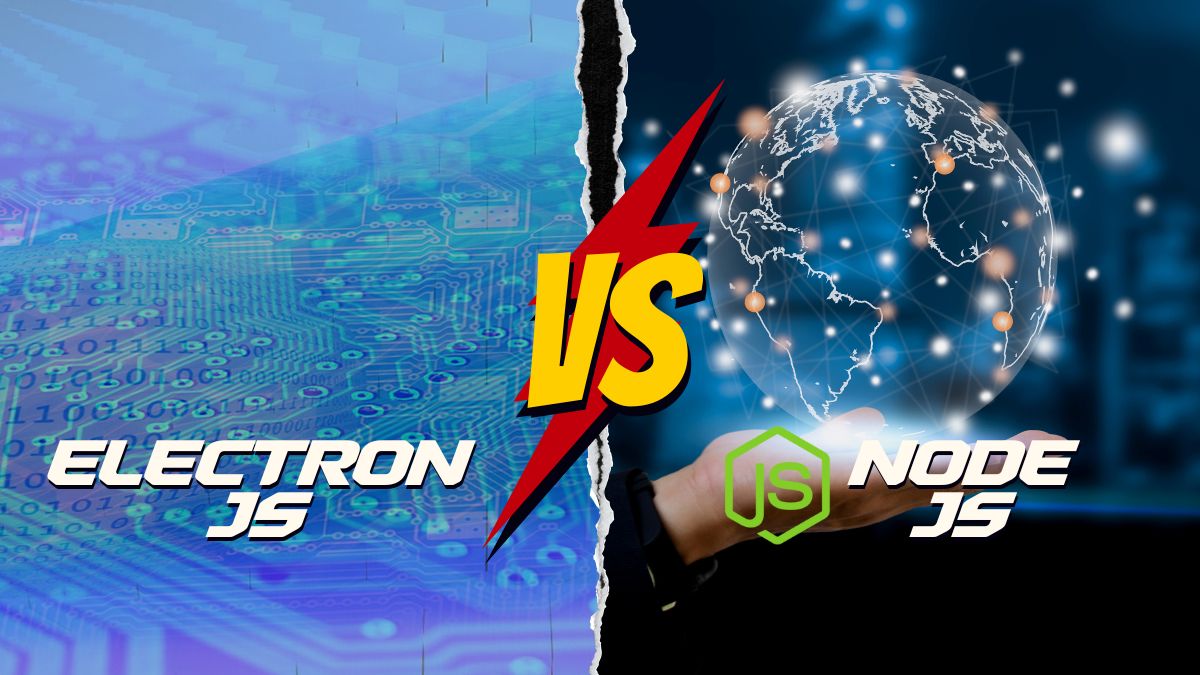Software Development
Electron vs Node.js – What are the differences?

Electron works more like the Node.js runtime.
If you’re a web developer, you’ve probably heard of Node.js. It’s a popular JavaScript runtime that allows you to build server-side applications. But what about Electron?
Electron is a cross-platform software framework that enables you to build desktop applications with JavaScript, HTML, and CSS. It’s used by companies like Microsoft, Facebook, Slack, and GitHub.
So, what are the differences between Electron and Node.js? Let’s take a look.
Short Introduction
Node.js is a cross-platform, open-source JavaScript runtime environment that executes code outside of a browser. Node.js lets developers use JavaScript to write command line tools and for server-side scripting—running scripts server-side to produce dynamic web page content before the page is sent to the user’s web browser.
Electron is a framework for creating native applications with web technologies like JavaScript, HTML, and CSS. It takes a web page and runs it in an isolated world so to speak where the code has access to Node.js APIs and the DOM but not to the entire operating system.
What is Electron?
Electron is a framework for creating native applications with web technologies like JavaScript, HTML, and CSS. It takes care of the hard parts so you can focus on the core of your application.
Electron is open source and maintained by GitHub. The main community contribution occurs through issues and pull requests on GitHub.
Documentation for Electron is maintained at electronjs.org/docs.
For questions or discussions please use the forums at electronjs.org/community.
What is Node.js?
Node.js is a cross-platform, open-source runtime environment that allows developers to create all kinds of server-side tools and applications in JavaScript.
Despite being just a runtime environment, Node.js comes bundled with many features, the most important ones being a package manager and an extensive set of developer tools.
With Node.js, you can develop everything from basic command line tools to complex web applications, and you can deploy your Node.js-based applications on premises or in the cloud.
6 Key Differences Between Electron and Node
- Electron is a framework for creating native applications with web technologies like JavaScript, HTML, and CSS.
- Node.js is a runtime environment for JavaScript that allows you to write command line tools and server-side scripts.
- Electron uses Chromium and Node.js to build cross-platform desktop apps.
- Node.js is primarily used for creating network programs, like web servers.
- Electron apps can be faster to develop than traditional desktop apps because they don’t need to be recompiled for each platform.
- Node.js apps can be faster to develop because they can be written in one language (JavaScript) and run on multiple platforms.
When to Use ElectronJS vs NodeJS
In general, Electron is used for building cross-platform desktop applications, while Node is used for creating server-side applications. Electron uses web technologies such as HTML, CSS, and JavaScript for its user interface and the majority of the app logic, while Node is used to execute code on the server. Although both Electron and Node are based on JavaScript, they have different purposes and use different APIs.
If you’re building a desktop application that needs to run on multiple platforms, Electron is a good choice. For example, if you’re building an app that needs to access the file system or other native OS features, Electron provides APIs to do so. On the other hand, if you’re building a web application that will be hosted on a server, Node is a better choice because it’s designed specifically for server-side applications.
Short Conclusion
In conclusion, Electron.js and Node.js are both great choices for cross-platform software development. While Electron js is more suited for desktop applications, Node js is better suited for server-side development.
References
-

 Cyber Risk Management3 days ago
Cyber Risk Management3 days agoHow Much Does a Hosting Server Cost Per User for an App?
-

 Outsourcing Development3 days ago
Outsourcing Development3 days agoAll you need to know about Offshore Staff Augmentation
-

 Software Development3 days ago
Software Development3 days agoThings to consider before starting a Retail Software Development
-

 Grow Your Business3 days ago
Grow Your Business3 days agoThe Average Size of Home Office: A Perfect Workspace
-
Solution Review3 days ago
Top 10 Best Fake ID Websites [OnlyFake?]
-
Business Imprint3 days ago
How Gaming Technologies are Transforming the Entertainment Industry
-

 Gaming Technologies1 day ago
Gaming Technologies1 day agoHow to Set Up Text-to-Speech for Channel Points on Twitch







